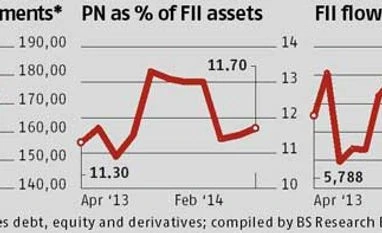P-Notes or PN are instruments issued by registered foreign institutional investors (FIIs) to investors abroad who wish to invest in the Indian stock markets but without registering themselves with the market regulator, the Securities and Exchange Board of India (Sebi).
Almost a fourth of foreign inflows during 2013-14 into the country had come in March, the final month of the financial year. FIIs invested about Rs 20,000 crore ($3.2 billion) in Indian equities, while total investment during the financial year was Rs 79,000 crore. Sebi is yet to disclose the official P-notes data for March.
The notional value of investment of P-notes was Rs 1.73 lakh crore in February, the most in three months. The portion of P-notes of the total foreign assets in the country was 11.7 per cent.
Experts said the investments through P-notes would go up in March and April, as foreign investors look to play the election theme. “A lot of global investors, who aren't registered in India, will play the big election event through P-notes. Instead of going through the tedious process of registration, they will invest through P-notes. If the election outcome is favourable and the Budget announcement is also positive, they might think of registering,” said U R Bhat, managing director, Dalton Capital Advisors.
Vikas Khemani, chief executive officer, Edelweiss Securities, said investments coming through the P-notes route are typically of a short-term nature and, hence, could be a cause of concern. “Foreign investors who want quick access to the Indian market, invest through this route. The moment hedge fund activity picks up, we see more flows through this route,” he said.
Some say the investments through P-notes are growing in line with overall foreign flows. FIIs have invested heavily in Indian stocks on hopes of a revival in the economy following a stable government after the election.
“FIIs have been bringing in money in recent times, with longer term money coming in as well....inflows could see further traction post the new government coming to the power and implementing its policies,” said Deven Choksey, managing director and chief executive, KR Choksey Securities.
“FII investments are on the rise due to the incremental hope given by minor improvement in economic indicators like the current account deficit. On the other hand, FIIs also believe the new government will put the problems behind, especially on the taxation side. The issue of retrospective taxation had really hurt the confidence of FIIs,” said Bhat.
High investments through P-notes have often come under the Sebi scanner, including the recent notices issued by the regulator to several corporate houses. The capital market regulator has issued notices to Indian-listed firms to probe whether they’d made investments into their own companies through foreign accounts.
)
